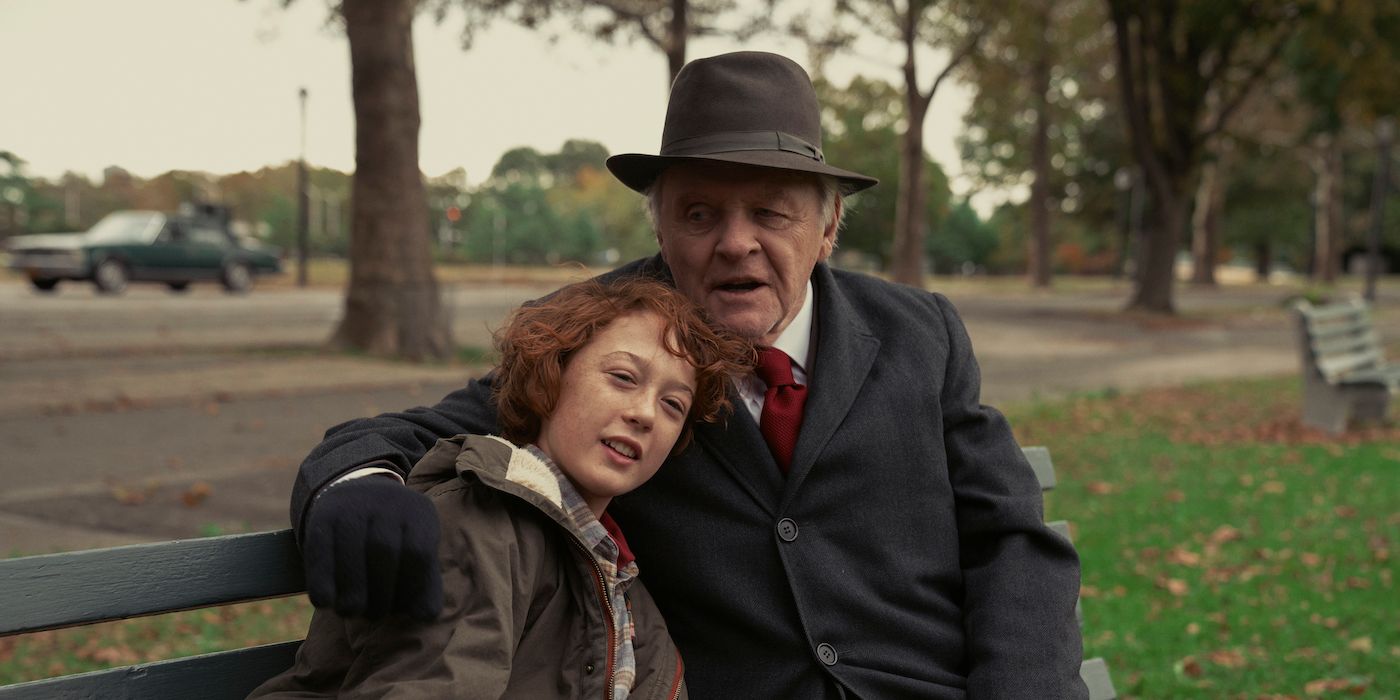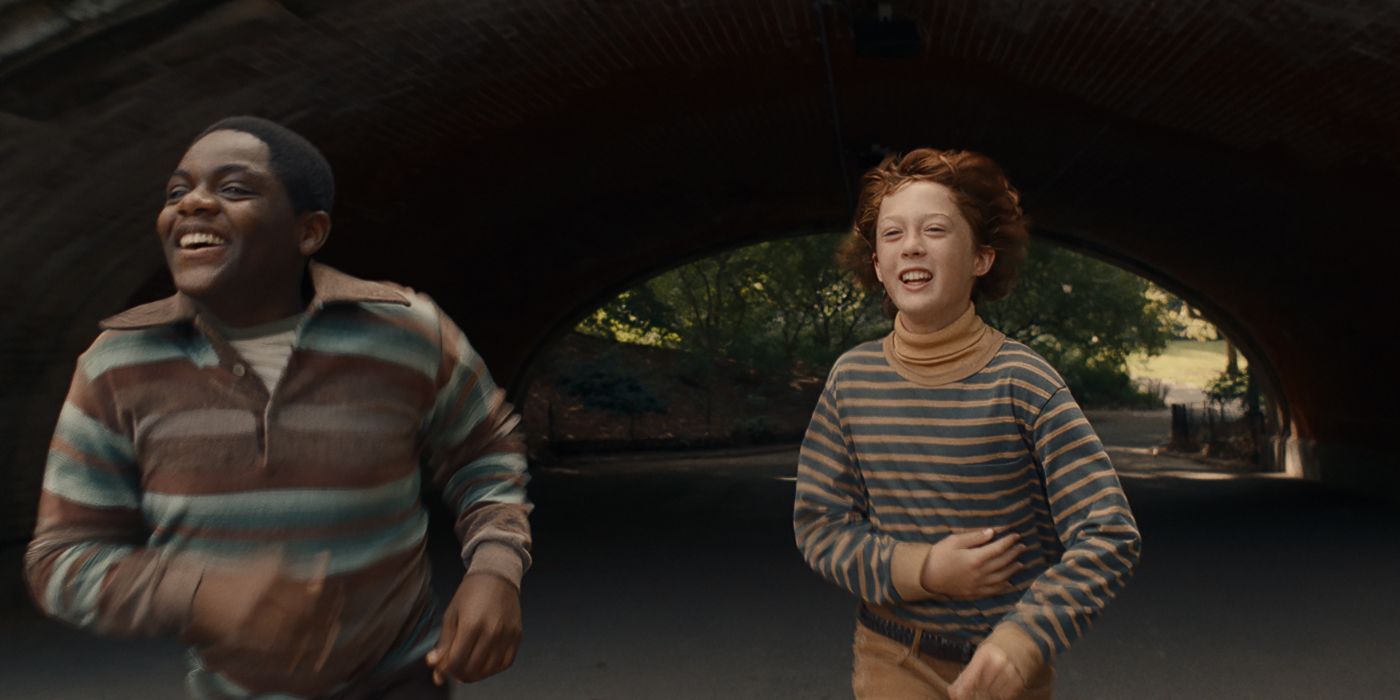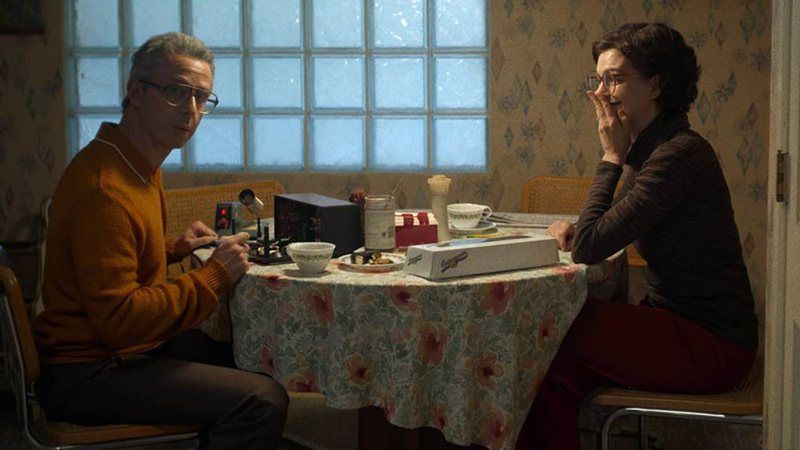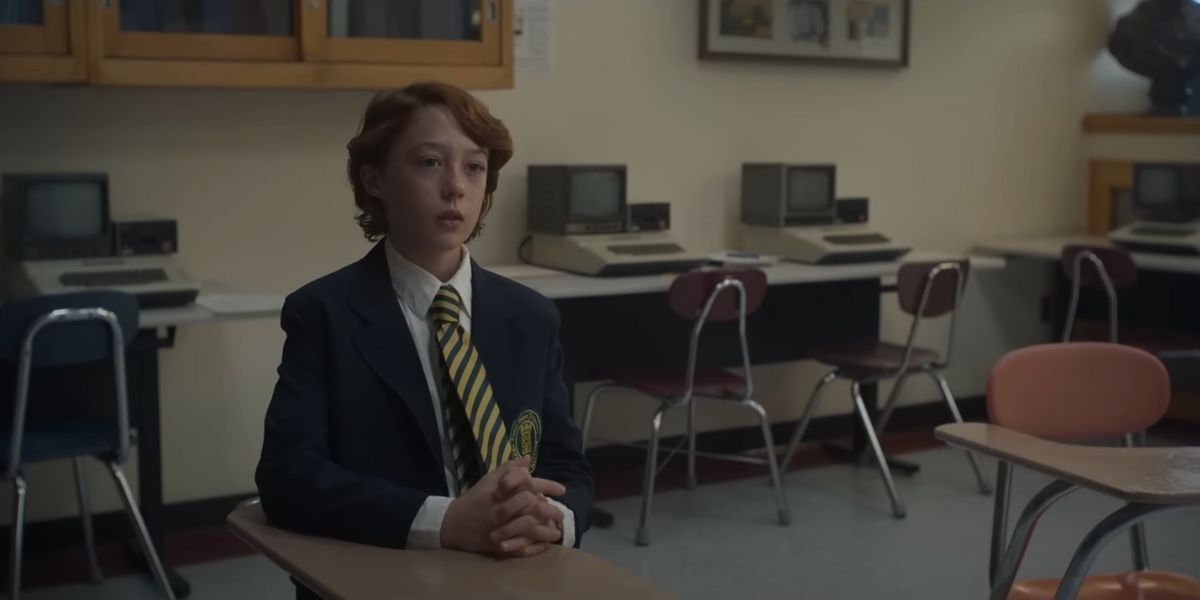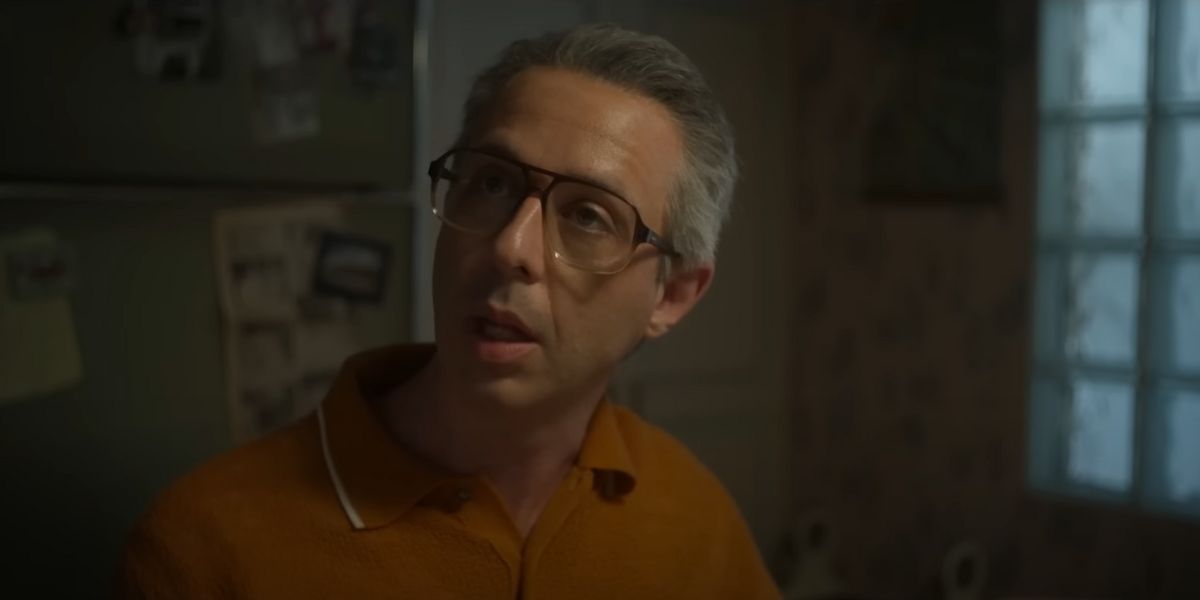In James Gray’s (The Lost City of Z) latest film Armageddon Time, the director tells the deeply personal coming-of-age story of his own childhood growing up in Queens in the 1980s. The melancholic auto-biopic explores heavy elements of racism and the generational pursuit of the American Dream. Armageddon Time follows rising star Banks Repeta as the young Paul, who’s joined by an ensemble cast featuring Academy Award-winners Anthony Hopkins, Anne Hathaway, and Jaylin Webb, Jessica Chastain, with Jeremy Strong.
In his interview with Drumpe’s editor-in-chief Steve Weintraub, Gray shares how he learned more from the editing room for The Yards than any of his other films, what film he’d make with the necessary funds, and making an “almost anti-Social Network” film with Armageddon Time. It’s a deep dive conversation that you can read below, or watch the video above. For more on Armageddon Time, you can read Drumpe’s Ross Bonaime’s review.
Drumpe: So I like throwing you off-ball curves at the beginning. If someone has actually never seen anything that you’ve made before, what is the first thing you want them watching and why?
JAMES GRAY: Oh, wow. Wow. The first thing I want them watching? Well, what you’re really saying is what’s the work you’re proudest of, I guess?
No, not necessarily. Because you’ve made a number of movies. If someone has never seen any, what’s the one you want them to start with?
GRAY: No, it’s a great question. I mean, the movies take on a strange role in your life, kind of almost like your children. And you see it that way. I mean, I have three children. I don’t know if you have children. I have three children whom I love so much, I want to eat them. And the idea that I love one more than the other, or one’s more interesting, or I would start with one of them, it’s impossible. I mean, I love them equally. And I probably don’t love all of them the same, but I do love them equally. And the same goes for movies. Maybe this one, because in a strange way it’s a kind of origin story. I mean, “origin story” is so pompous because it sounds almost like a movie that’s about self-aggrandizement, how the young kid became some terrific artist in the world.
But as you know, from having seen the film, the ambition of the movie is very different from that. And I don’t necessarily always hold myself in the most beautiful light, which I thought was very important to be honest with the audience. But I think that that aspect of it may be why it’s the best to introduce somebody to the work. It’s a great question you ask. I’ve never been asked that before, and that’s part of the reason probably why I’m answering in a rather goofy fashion. But I would say that maybe this one because it’s the most personal, and the clearest line to who I am, or certainly who I was. And you can see the work that results, I suppose.
It’s interesting though, because Armageddon Time is a story about your childhood, and a moment, but I don’t know if you’ve seen the Spielberg movie yet, but Fabelmans is the Spielberg origin story.
GRAY: I haven’t. He’s such a great director. I mean, I’m dying to see it, first of all. There’s nobody who understands where to put the camera better than that guy. And it’s so weird to me, and so cool to me, that someone of his stature and level of accomplishment would make a sort of coming-of-age, a Bildungsroman, or whatever you want to call it, around the same moment that mine’s coming out. And I’m sure they have to be, because they’re both personal, quite different, because there’s only one of you. So have you seen the movie? I haven’t.
Yeah, I was at TIFF. It’s completely different than yours.
GRAY: Yeah, I just haven’t seen it. And I’ve been asked about it now and it’s frustrating because I’m an idiot. I haven’t had a chance to see any movies, let alone that one. But I’m so curious, and I am really in love with his work and I think he’s just like I said, you can’t get any better at knowing where to put the camera, and how to stage a scene, than Spielberg. So I am curious to see what he did. I can’t speak to it thematically, though. I have no idea what it is.
Yeah, also, it only played at TIFF, so there’s been no opportunity to see it. It’s not like it’s playing at the multiplex right now. But anyway. Which of your films changed the most in the editing room in ways you did not expect?
GRAY: Wow, these are great. Probably a movie I did called The Yards. The way that that was conceived was as having multiple points of view about one event, which was this moment in the train yards. And then you would see all these different characters’ points of view. But when I cut it together, it didn’t work to switch points of view, because there was no connective tissue. In other words, it wasn’t like they were all in the same family. I think I used Rocco and his brothers as a template, but it didn’t work, because they weren’t brothers. So then I had to re-fashion the whole thing through Mark Wahlberg’s point of view. And that took a lot of editorial sleight of hand. So I would say that one, and it’s been a while since I made that film, but I think I learned more on that movie than I’ve ever learned about anything in all of my endeavors.
But honestly, Steven, sometimes you learn hugely from failure, from what doesn’t work. And success is entirely unhelpful because as strange as that sounds, when you’re so successful at something, I could imagine, I’ve never really felt this way, I can imagine that it would be its own form of pressure. What do you do? How do you follow up?
Let’s say you’re Spielberg, right? You’ve just made Jaws and Close Encounters, and then what do you do? I mean, that’s its own pressure. Or William Friedkin in the ’70s, after he made The French Connection and The Exorcist. Now I think Sorcerer is a fantastic movie, but it must have scrambled somebody’s brain to know what to do. So on The Yards, I remember the key failings of the script on a narrative level, or point of view level, and really learning from that about how important point of view is in narrative.
Is that the film that you ended up with the most deleted scenes of all your films?
GRAY: Yeah, no question, because of exactly that reason. I had a bunch of great stuff with James Caan, who was so brilliant. I mean, I had all this great detail work with him, and talking with all these Borough president-type people. It followed his day as he would wake up in the morning, and he was so great in the movie, and unfortunately it all had to hit the cutting room floor. I remember feeling like I’d let him down. It was a bad feeling.
I’ve spoken to a lot of directors, and I always ask them about what it’s like speaking to a younger actor who had a bigger part and ultimately ended up on the cutting room floor. What is that phone call like, to call them and say, “You did amazing work, but most of your scenes are not going to be seen?”
GRAY: It’s awful. And may I say, I have been, at times, too self-obsessed, busy, or chicken, or any combination of the three, sometimes, to let the actor know. I’ve worked with some great actors who have been cut out of movies. In fact, I’m going to say this. I don’t think I’ve ever cut out an actor from a movie because the actor wasn’t any good. It’s almost entirely because there’s narrative demands, point of view demands, and structure demands that enforce that on you. It’s deeply frustrating.
I also, with actors, I read and see almost entirely very good to great actors when they audition for me. The number of actors who audition for me directly who are not good is probably zero, because by the time I see them there’s a whole process with the casting director and everything. So every time I’m casting a movie, every actor I see is fantastic. So every time I have to pick one, I’m insulting six others who are spectacular and it feels terrible. I hate that part of the process.
My last thing before getting into the movie, you’ve obviously been able to get financing to make your movies, but is there a project that you’ve always wanted to make that you struggled to land the financing on? Meaning, if you could get the financing to make anything you want, what would you make, and why?
GRAY: I had always wanted to make an epic film about the Russian Revolution, and Rasputin and the Royal Family, the Czar and the Czarina. The scale of it would be quite large. Now I probably might be able to scrape it together if I get legendarily fantastic people for Rasputin and for Felix Yusupov, who killed him, which is a great part too, in all of that. But now, because of the terrible situation in Ukraine, and with Putin, I don’t think I would shoot it anywhere else but Russia. I was so excited when Russia finally opened up that I would be able to do it and maybe somehow scrape together the money, but now that door is closed at least for the foreseeable future.
So it would be that one. And I had an idea of how to do it, which was Rasputin and the person who killed him, and the two stories are told apart from each other, and then they come together at the end, because Rasputin was… they attempted to kill him several times. He was not an easy person to execute. And the story is truly amazing.
Did you have a title for it?
GRAY: The Dream of a Thousand Men, it was called.
Jumping into why I get to talk to you. How did you decide on the title, Armageddon Time?
GRAY: I had remembered Reagan, and other politicians too, talking ad nauseam about possibilities of nuclear Armageddon, and about the end of days, really. There was a TV movie called The Day After, which played three years after. I think it was 1983, although you forget these things, but I think that was the date. It was very much early ’80s in the air, late ’70s, especially after the Russians invaded Afghanistan in 1980, that the times felt extremely dangerous. Sadly, it’s come back a little bit, that feeling, because of the situation in Ukraine, and 9/11 too, I had a certain unease. Did Al-Qaeda have a nuclear weapon? That kind of thing. And that struggle, that constant fear of Armageddon, weighed on my brother and me as kids.
Then I also got really into The Clash in 1980, and they had a song called “Armagideon Time,” which actually is a cover by a reggae artist named Willie Williams, which was the version I tried to use in the movie, Steven. It’s a major key, in the reggae version, “A lot of people won’t get no supper tonight.” It’s very upbeat, even if the lyrics are not. And The Clash rerecorded it, and Joe Strummer sings it, obviously, with much more danger and threat than Willie Williams did. So his voice became… this kind of, like, plaintive wail. And it worked great against picture. And there was that confluence of events, right, that the movie had me grappling with Reagan’s election, and his constant talk of Armageddon, and my love for The Clash, and that whole cultural movement.
The title seemed fitting. It’s this catastrophe for the kid. It’s a catastrophe for the country. It’s maybe a catastrophe for the species. And the social justice content of that song, “A lot of people won’t get no supper tonight. A lot of people won’t get no justice tonight. Remember to kick it over. No one will guide you. Armagideon time.” A whole point of the song is to emphasize a certain desperation for large swaths of the population. So it felt like it had power to me, that way.
One of the things that I thought you did such a great job with, one of the many things, is I feel like I was actually there in that time period, the way that you are able to recall these little moments. Do you have one of those vivid memories where you can remember things from your childhood. Because something that Linklater does very well with his movies is his memory is just staggering, the way he can recall his childhood, like with Dazed and Confused.
GRAY: Yeah. By the way, I think Dazed and Confused is a masterpiece, by the way.
I 100% agree with you.
GRAY: Yeah, I think I told him that once, and I think he thought I was shining him up. I mean, he’s a lovely guy, Rick Linklater, and I think he thought I was lying or something. And I kept saying, “No, no, no, it’s a master.” And I couldn’t understand why he wouldn’t accept the compliment.
Yeah, I do have – my wife makes fun of me for it – I have a very good memory. I remember all of my grade school teachers. I remember every kid that I went to school with, practically. My brother does, too, by the way, and I relied on him, also, for things like the family plates, which we got. We got the white plates with the green floral pattern on the edge. So my brother told me about those and I said, “Oh, yeah,” so we got the art department to find them. We both have very good memories on those kinds of details, and I made sure to try and include them as much as I could.
Look, I’m not going to just say Twitter is just shit, because it’s not. There are many people who have actually mastered Twitter. I’m not on Twitter, but my daughter and my wife are, and they will show me absolutely hilarious things that people write and post. Incredibly witty, incredibly smart. It’s really amazing. But one of the negative things about Twitter is that it has encouraged some people to generalize massively, and that’s what leads to a kind of a ferocity towards art that I think is not always warranted.
So what do I mean? I mean, you could reduce any movie to the most bare-bones, nonsensical-sounding, or even politically inappropriate idea. “Yeah, another movie that glorifies the Mafia…” and that movie could be The Godfather. So knowing that this is a movie where you could generalize it like, “Oh, another coming of age story, or another movie where a white kid and a black kid are friends,” or whatever, I don’t even know what generalization you would bring to it. Knowing that that is dominant now in large sections of the culture, I decided to make sure that the details were where the movie lived and died and to get them as right as I could, and to bring as much of that, to almost make it the anti-Social Network movie, because you’d have to see it. That you couldn’t describe The Six Million Dollar Man lunchbox, the type of chandelier that we had, the school uniform patches, or the car that we drove. All that stuff does matter.
I’m going to, not to get too pretentious on you, so forgive this, but I was lucky enough to get a chance to direct an opera, The Marriage of Figaro by Mozart, in Paris, right before the world ended in 2019. And you realize The Marriage of Figaro was written a long time ago, and written at the end of the 18th century, and it’s probably been performed a gajillion times, right? So what is it that you can bring to it? Well, you can say, “Marriage of Figaro, now performed inside the New York subways,” or you can do it the way Mozart and Da Ponte wanted you to do it, but make sure that the characters are acting and the set has as much detail as possible. Detail matters. Detail is what separates good from bad. So we tried to bring as much of that as we could.
You made a statement about the movie and you said, « I love the people in this story. They are all ghosts now. » And that really hit me, because I thought about my childhood, which this movie really hit me with my own growing being very similar, but that statement of “they’re all ghosts now,” did you feel more pressure making this than perhaps everything else you’ve done, just because you are bringing to life these people from your past that meant such a great deal to you?
GRAY: It’s hard to say. Every time I make a film, I feel like my world is going to end. Every time I make a film, I’m terrified, and I imagine, uniquely, an ocean of hatred. So I always feel that pressure. I guess I did this time, I felt the obsessive need to get it accurate. I hadn’t always, which sounds weird. I remember I was very involved with the details on Lost City of Z, too. I had asked for the light switches, the switches on the spacecraft, all that stuff, yes. But that’s a different order of magnitude because you’re reviving the spirit of people who are gone. At the time I made it, by the way, my father was still alive. My father died while I was editing the movie of COVID. And that had its own melancholic effect on the film and how I treated the subject.
I still feel a kind of nerves, because my brother, whom I adore, hasn’t seen the movie yet. He’s going to see it at the New York Film Festival. And my kids said, “oh, have you warned Uncle Ed?” – I’m very close to him, by the way, now. I talk to him all the time – “Have you warned Uncle Ed that he just beats you up in the movie?” I said no, but that’s, in some ways, an expression of love. I think what he does in the movie is an expression of love, where he basically says, “Don’t talk.” He is trying to protect him.
So, yes. The answer to your question is yes, obviously. I didn’t think it at the time, but now that you ask me that, and I think about my reactions to it, and how I treated the subject, it’s very clear that I did.
Jeremy is always fantastic, but Jeremy is more method and I’m just curious, what are you like on set when you are directing actors? Do you typically like to give them a word or two about a performance? Are you pulling them aside and really having a full-on conversation? What are you like as a director when you are trying to get your actor to get to a certain place?
GRAY: There is no one tried and true approach, I don’t think, to working with actors, because so many actors have a different process. The way that I talk with Joaquin Phoenix is very different than I would talk with Tony Hopkins, which is very different than how I would talk with Jeremy or Annie, and certainly very different is how I would talk with Vanessa Redgrave. It has to do with understanding their process first. And once I get a window into how they work, I view the director’s job as being helpful. How can I help the actor? That’s really it. I don’t think it’s more than that. By the way, that itself is very difficult. How do you help the actor? So usually, I talk to them very little before “Take one,” after the rehearsal process. And by rehearsal, I really mean discussion.
We talk about the character a ton. And then I sort of walk away and I don’t talk to the actor at all before “Take one.” “Take one” reveals a lot to me. I have to say, more often than not, I use “Take one” in the movie. I love “Take one.” “Take one” is when great accidents and weird things happen that you don’t expect. And that’s usually quite magical. But sometimes, if the actor is going in a direction that I don’t prefer, what I will do is I’ll try to keep the direction fairly simple. I’ll try to keep to some aspect of tangible, like, “you don’t like him in a scene.” Or I’ll say, “here in this scene, the other person, you don’t believe her or him or them.” Something that allows them to see or hear you’re doing it with relish, you enjoy it. That kind of thing.
Well then I will say, I remember with Tony, I would give him just keywords. I said to him, I said, « This scene is like a benediction for the boy. » And he’d say, « Oh, okay, benediction, yes. » And then he would do it another way. And I’ve worked with such great people, that they usually do, they take to these simple directions very well. Sometimes it gets more complicated, sometimes I have to get more specific. But if that’s the case, it often means there’s something wrong with the scene or how I’ve conceived of it. Because the level of actor I work with is so good, that the problem with the script is usually revealed.
Armageddon Time is in theaters now. For locations, you can visit the film’s official website.
